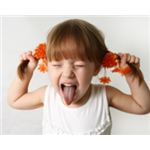Oppositional Defiant Disorder In Children
 Oppositional Defiant Disorder is a disease, or better it could be said to be state of mind of the child. Children suffering from this problem are of defiant nature and are hostile not only towards their fellow children, but more so towards people older to them. These children carry a feeling of anger towards others and get easily provoked seemingly for no reason. They always blame others without ever considering that they themselves may be at fault.
Oppositional Defiant Disorder is a disease, or better it could be said to be state of mind of the child. Children suffering from this problem are of defiant nature and are hostile not only towards their fellow children, but more so towards people older to them. These children carry a feeling of anger towards others and get easily provoked seemingly for no reason. They always blame others without ever considering that they themselves may be at fault.
Study has revealed that it is not essential that they are aggressive with all the people whom they meet. Some of them display normal behaviour at school or while meeting others, but are aggressive at home when with parents and siblings. It has been observed that problems surface when meeting those known well to them and an occasional visitor has no clue that these children are any different from the rest.
Such children tend not to mix up with others, and always blame the others for fighting with them or instigating them to fight. It is often difficult for the doctors to diagnose such children as they will tend to be normal or extra polite to the doctor. However, long sittings can enable the doctor to see the child in his true colours.
Though most of the problems of the children can be solved by proper attention but the problem is that they become more aggressive with those who attend to them, may be parents or counsellors. As a result of this, in view of some researchers, these children get ignored both by teachers and parents.
It is not correct to say that this problem is incurable. It can be cured but will require a lot of effort. There are both medical and human cure for these children. Medical cure is a long drawn out process. Antidepressants and other pharmaceutical remedies have proved to be effective but the parents will have to be ready or long treatment. The other remedy is allowing these children to have their will though selectively.
There is a tendency of leadership amongst them. If provided with an opportunity, these children can prove to be good leaders in class or at school. If their energy is properly channelized, these associated with them are bound to benefit, but it is essential that those associated with them should try to assist them and should not try to isolate these children. Also, they as leaders will know firsthand what it feels like when someone defies your authority and may help them to mend their ways.
All the therapies are long term treatment for these children. If medicine is not helping then social contact is the other option. A child suffering from this disorder should get encouragement and appreciation for even small things done according to social norms. If it is not possible individually, help of specialised therapists should be taken.